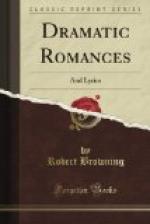Or fruit, tobacco and cigars? 230
A pilot for you to Triest?
Without one, look you ne’er so big,
They’ll never let you up the bay!
We natives should know best.’
I turned, and ‘just those fellows’ way,’
Our captain said, ’The ’long-shore thieves
Are laughing at us in their sleeves.’
III
“In truth, the boy leaned laughing back;
And one, half-hidden by his side
Under the furled sail, soon I spied,
240
With great grass hat and kerchief black,
Who looked up with his kingly throat,
Said somewhat, while the other shook
His hair back from his eyes to look
Their longest at us; then the boat,
I know not how, turned sharply round,
Laying her whole side on the sea
As a leaping fish does; from the lee
Into the weather, cut somehow
Her sparkling path beneath our bow
250
And so went off, as with a bound,
Into the rosy and golden half
O’ the sky, to overtake the sun
And reach the shore, like the sea-calf
Its singing cave; yet I caught one
Glance ere away the boat quite passed,
And neither time nor toil could mar
Those features: so I saw the last
Of Waring!”—You? Oh, never
star
Was lost here but it rose afar!
260
Look East, where whole new thousands are!
In Vishnu-land what Avatar?
Notes: “Waring.” In recounting the sudden disappearance from among his friends of a man proud and sensitive, who with fine powers of intellect yet incurred somewhat of disdain because of his failure to accomplish anything permanent, expression is given to the deep regret experienced by his friends now that he has left them, his absence having brought them to a truer realization of his worth. If only Waring would come back, the speaker, at least, would give him the sympathy and encouragement he craved instead of playing with his sensibilities as he had done. Conjectures are indulged in as to Waring’s whereabouts. The speaker prefers to think of him as back in London preparing to astonish the world with some great masterpiece in art, music, or literature. Another speaker surprises all by telling how he had seen the `’last of Waring ’ in a momentary meeting at Trieste, but the first speaker is certain that the star of Waring is destined to rise again above their horizon.
1. Waring: Alfred Domett (born at Camberwell Grove, Surrey, May 20, 1811), a friend of Browning’s, distinguished as a poet and as a Colonial statesman and ruler. His first volume of poems was published in 1832. Some verses of his in Blackwood’s, 1837, attracted much attention to him as a rising young poet. In 1841 he was called to the bar, and in 1841 went out to New Zealand among the earliest settlers. There he lived for thirty years, filling




